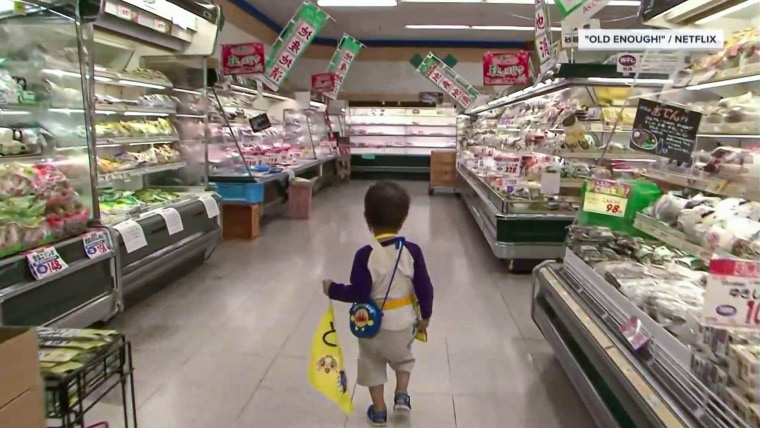I was born in Taiwan and grew up there until the age of 5. Every day, I walked by myself to and from preschool, located just across the street from our apartment in Taipei. But after immigrating to the United States, my single dad told me not to tell anyone I stayed by myself in an empty house after school.
Watching Netflix’s “Old Enough,” a Japanese reality show about children as young as 2 years old going on solo errand trips, I wondered how much the show represents different cultural norms when it comes to parenting in Asia (specifically Japan) compared to the United States, with its infamously overprotective “helicopter” and “bulldozer” parents.
I wondered how much the show represents different cultural norms when it comes to parenting in Asia (specifically Japan) compared to the United States.
“Old Enough” is a beloved, long-running reality show in Japan where young children are secretly filmed running errands on their own for the very first time. As I watched the 20 short episodes (which are streaming on Netflix in 190 countries), I found myself smiling as adorable children go on their first adventures in quaint seaside and countryside villages. I cheered when the 2-year-olds remembered the list of groceries they had to buy at the local market and gasped when a 5-year-old dropped their newly purchased fish on the sidewalk. I teared up watching considerate neighbors help each child along the way as the host says, “It takes a town to raise a child, and a town to look after one.”
But how realistic is “Old Enough” in representing Japanese culture? I asked Matthew Marr, an associate professor of sociology at Florida International University, who has studied homelessness in Japan and the United States. He warned that we should be careful not to generalize about an entire culture from a single show.
“The show is popular in Japan because it is also rare for parents to send 2-year-olds out on their first errand there,” he told me over Zoom. He also pointed out that most of the children featured in the show live in rural areas, which are perceived as “safer” than urban areas. Similarly, 18-year-old Morishi Ito, a student at Kyoto Sangyo University, sees the show as presenting “special cases” of very young children that do not reflect the experiences of him and his peers who grew up in more urban areas like Tokyo or Osaka.
More commonly, Japanese children begin going on solo errands starting in elementary school, according to Ito. This still contrasts with U.S. culture, where it’s rare to see elementary school-age children going out to buy groceries by themselves. In Japan, such behavior is so common that it receives infrastructural support via special “yellow flags” placed at stoplights for young children to pull out, hold up as they cross and put back on the other side, according to Marr.
Consequently, the show does allude to a more general Japanese practice of encouraging children to walk to school, run errands and do things on their own. According to a class of Japanese students at Kyoto Sangyo University, a common phrase among Japanese children is “I can do that myself!”
U.S. viewers of “Old Enough” may draw the conclusion that Japanese parents teach their kids to be more independent than America’s helicopter parents — who have developed a reputation for being scared for, and controlling of, their young offspring — do. But learning to do things on their own at a young age is not the same as developing independence from one’s family, according to Michie Kawashima, an associate professor of international relations at Kyoto Sangyo University.
Kawashima said she sees letting her 10-year-old child travel to and from “cram school” tutoring sessions on their own as helping her child “be more capable in their daily lives,” not forcing her child to be independent from her. In fact, Kawashima said she feels that, in comparison to those in the United States, her Japanese college students are “more dependent on their parents.” Kawashima said Japanese students rely on their parents financially and “rarely pay for college.”
She also said she believes Japanese youth depend on their parents “mentally” by “following their parents’ advice on what kind of jobs to take.” She pointed out that despite doing solo errands at a young age, Japanese youth “rarely leave their parents’ homes at age 18 and sometimes stay until the age of 30.”
Viewers of “Old Enough” should not confuse communal responsibility with individual independence.
Consequently, viewers of “Old Enough” should not confuse communal responsibility with individual independence. This is something people living in Japan may discern more easily.
When asked what reality shows influence how people in Japan see the United States, Rei Uezato, a first-year undergraduate student at Kyoto Sangyo University, mentioned Will Smith slapping Chris Rock at the Academy Awards ceremony. They said the incident showed that “Americans behave not according to social pressure but according to their individual beliefs.” In Japan, how society thinks of you often overrides individual desires.
While this is an insightful observation based on Uezato’s understanding of Japanese cultural norms, it does not capture all of the nuances surrounding a single incident at the Academy Awards, nor should it be extrapolated to all of U.S. culture.
In the same way, I learned I should not view a Japanese reality show about a select group of children through a U.S.-centric lens, nor see it as representing all Asian or Japanese culture. Instead, I should enjoy “Old Enough” like Japanese audiences do — as reality TV.
Source: | This article originally belongs to Nbcnews.com











